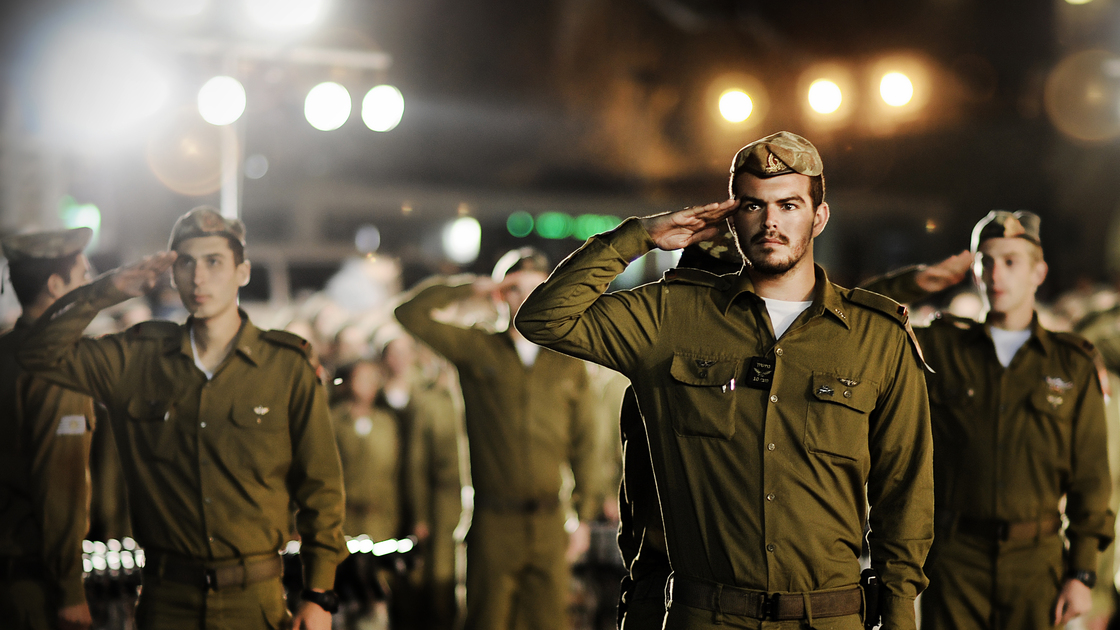Over the last couple of years, I was given the chance to work on the Ophel archaeological excavation in Jerusalem. Many of my fellow diggers were young Israelis around my age, but their life experiences had been markedly different. The teen and young adult years of these Israelis are pockmarked by a stage in their life that hardly any other Westerner goes through: conscription.
Military conscription is something almost all young Israelis must face, men and women alike. Beginning at age 18, men spend three years in mandatory military service, and women spend at least two. It is just a fact of life for Israeli teens, another inevitable stage in development, something they spend their young lives anticipating. Those who wish to continue a career in the military may stay on longer. Those who leave can then take up higher college education or enter into the workforce.
At the archaeological dig, I would ask my fellow workers—who were around my age in their early 20s—about what their jobs were while on duty. One, a tank driver. Another, an artillery man. One young woman was a commanding officer for a group of tank engineers. One young man had spent his time jumping out of airplanes as a paratrooper. These were ordinary young people working on the dig site—people who had never met before, but all connected by the common bond of military service. These youth were forced to grow up quickly, and had already experienced during their teen years things most other Westerners would never hope to experience during a lifetime. The experience matured them like nothing else.
My assistant supervisor told me about his military service. Some of his friends, who were conscripted slightly earlier than him, found themselves embroiled in the 2006 Lebanon War. He said his friends still suffer from haunting memories of that devastating conflict.
Nearing the end of the 2012 excavation season, Operation Pillar of Defense began in response to belligerent rocket attacks from Gaza. As the days of the operation wore on, a few people went missing from the dig site—it turned out they had been called up on standby in preparation for a potential ground invasion into Gaza. When our friends returned, we heard about their several-day wait on the border, amongst the tanks and trucks, ready for an order to invade. Fortunately for them, that order never came.
That is another thing: While conscription service ends after two to three years, Israelis remain on call should another serious conflict flare up. And up to once a month, every year, Israeli men may be called up for reserve service, until they reach the age of around 45.
The training process for Israeli soldiers is unique. Oftentimes at our excavation in Jerusalem, large groups of young Israeli soldiers in dark green military uniforms would come by and look in to the dig site from the perimeter fence. The young conscripts take tours around the significant historical sites. Why? So that they can better understand what they are fighting for. What other military does that?
The battles of those of us in the Church of God are not of this physical world (John 18:36). Should conscription be required in our own countries, it should be confidently refused, and we should be able to unashamedly state the biblical reasons why (for more information on this, request “Should a Christian Fight?”). But we can certainly see the spiritual parallels between our battles and those of the Israeli conscripts. Ephesians 6:12 says: “For we wrestle not against flesh and blood, but against powers, against the rulers of the darkness of this world, against spiritual wickedness in high places.”
We cannot fight effectively unless we understand what we are fighting for. How well do you know the history of what goes before you? How well do you understand the legacy that you are a part of? We should all have our own Church history fresh in our minds. Perhaps many of us young people can barely recall the court case. More than likely, we are much younger than the pcg itself. That is why it is so necessary to be well educated in our history! Obviously, none of the Israeli conscripts lived during the time of David. That is why they are toured around these historic sites—to remember and be inspired by what they are fighting for.
We should do the same. Malachi’s Message should be a well-thumbed book for us. Raising the Ruins is a fantastic memoir of our glorious history in fighting for the right to distribute the books and booklets Herbert W. Armstrong was inspired to write. And on a broader time scale, go through and study Hebrews 11. It is a moving summary of some of the Bible greats and their actions, fighting to defend the truth of God and obey Him. Those are big shoes for us young people to fill. Thus, we should never forget the legacy that has been set before us.
Israel’s military is often criticized by much of a media-frenzied, pro-Palestinian, anti-Israel Western world. More often than not, these are just armchair critics who have lived a cushy, privileged life, failing to see a rare army of dedicated teenagers and 20-somethings fighting for the survival and livelihood of their beloved nation.
We receive similar criticism—criticism that doubtless will only increase as time progresses. That makes it all the more important to be firmly grounded in the knowledge of what we are fighting for. So remember your history. Understand what you are fighting for as a young spiritual soldier for Christ.
